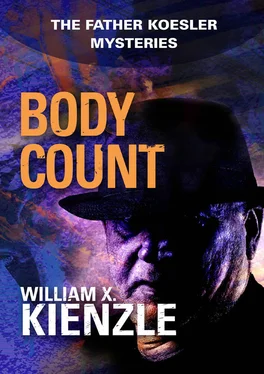William Kienzle - Body Count
Здесь есть возможность читать онлайн «William Kienzle - Body Count» весь текст электронной книги совершенно бесплатно (целиком полную версию без сокращений). В некоторых случаях можно слушать аудио, скачать через торрент в формате fb2 и присутствует краткое содержание. Жанр: Криминальный детектив, на английском языке. Описание произведения, (предисловие) а так же отзывы посетителей доступны на портале библиотеки ЛибКат.
- Название:Body Count
- Автор:
- Жанр:
- Год:неизвестен
- ISBN:нет данных
- Рейтинг книги:3 / 5. Голосов: 1
-
Избранное:Добавить в избранное
- Отзывы:
-
Ваша оценка:
- 60
- 1
- 2
- 3
- 4
- 5
Body Count: краткое содержание, описание и аннотация
Предлагаем к чтению аннотацию, описание, краткое содержание или предисловие (зависит от того, что написал сам автор книги «Body Count»). Если вы не нашли необходимую информацию о книге — напишите в комментариях, мы постараемся отыскать её.
Body Count — читать онлайн бесплатно полную книгу (весь текст) целиком
Ниже представлен текст книги, разбитый по страницам. Система сохранения места последней прочитанной страницы, позволяет с удобством читать онлайн бесплатно книгу «Body Count», без необходимости каждый раз заново искать на чём Вы остановились. Поставьте закладку, и сможете в любой момент перейти на страницу, на которой закончили чтение.
Интервал:
Закладка:
“Okay, you think about it. But,” Koesler admonished, “while you’re thinking, don’t do anything. Don’t speak to anyone about what you heard-not even to me anymore. Don’t do anything that would in any way link the murder of Father Keating to the man we heard confess that sin.”
“Okay, ” Dunn agreed, after some hesitation.
Koesler nodded. “Now I’m going to rest up a bit and get ready for dinner later on. Six all right for you, Nick?”
Dunn nodded.
“Then I’ll meet you here.” Koesler left the dining area for his room upstairs. He was exhausted, not only from his marathon of sermons this morning, but also from the extensive apologia for the sacrament of confession. As he stretched out on his bed, his last conscious thought was a wish that Guido Vespa had whispered as Koesler had more than once urged. If only Vespa had followed Koesler’s direction, Dunn would not have overheard and Koesler would have been spared this argumentation and contention. On the other hand, maybe it was a blessing that he was able to head off this young priest before he violated the seal and would have to go to the Pope himself for absolution.
In the final analysis, Koesler did not need any complication from any other source. It would be plenty hard enough for him to keep this secret. He could not let anyone-including Dunn-know just how hard. All that Dunn said was true enough: Vespa was a career killer, and to keep silence was to leave him free to kill again.
But there were no exceptions. There were no exceptions.
And so, on to a troubled nap.
4
Inspector Walter Koznicki, long-time head of the Detroit Police Department’s Homicide Division, took the steps. The elevators at 1300 Beaubien were working, but Koznicki felt that he too needed to work.
Koznicki was slightly over six feet tall; his weight at his recent physical examination was 250 pounds. Wanda, his wife, worried about that. He reminded her that he was big-boned. She reminded him that lately his clothes had been more than a little snug. He reminded her that it was natural to put on a bit of weight as one aged. She reminded him that was nonsense and that while his diet seemed about the same as always, he wasn’t getting the exercise he needed.
He could not argue that point. He should have been on the street more, but lately he seemed stuck to the chair behind his desk in his office. Wanda was right; he wasn’t getting nearly enough exercise. But while he admitted this only to himself, he did resolve to hit the bricks more regularly. Do some of those exercises-while-seated workouts. At all times choose the more physically demanding course. Thus, with the choice of elevator or stairs, use the feet.
By the time Koznicki reached the fifth floor, he was breathing hard. Proof, if he needed any, that he still had a way to go before he was as fit as he should be, as fit as he wanted to be.
As he traversed the hallway, he greeted the few officers on duty this Sunday afternoon. They were surprised to see him. No one could question Koznicki’s dedication, but he had long since been convinced that he would not catch all the criminals out there even if he worked around the clock. This conclusion made him a far happier man as well as making his wife a far happier woman.
Koznicki arrived at the squad room and looked in the open door. In the absence of a full or even a partial complement of detectives, there was little to catch the eye other than the drabness and dinginess. It was a place of work and every inch of it stated that fact. Tables and chairs of hard wood and ancient vintage, paint dull and peeling. No suggestion of comfort or frivolity.
Only one person occupied the office expanse. Lieutenant Alonzo Tully looked up as his boss entered. Tully, black, with close-cropped salt-and-pepper hair, was of medium height and build, and as fit as his inspector was out of condition. Much of Tully’s trim shape he owed to expenditure of nervous energy.
Normally, it was as natural for Koznicki to be home on a sunny Sunday afternoon as it was for Tully to be at work. Koznicki had not been surprised when he discovered on telephoning Tully’s home that Tully was at headquarters. Not for the first time did Koznicki reflect on how fortunate it was that Tully was blessed with a most understanding and patient mate.
Several files lay open on Tully’s desk. They represented some of the most intriguing cases his squad was working on. Open-and-shut crimes failed to interest Tully. He loved a mystery, and he felt drawn to the more complex puzzles. The enjoyment he found in his otherwise often macabre work came from unraveling the created maze and catching the bad guy. What the courts did with the perpetrator was the courts’ problem. Long ago he had found that the path to mental health lay in not being concerned with whatever was beyond one’s control. His responsibility was to catch the perp, which he did as well as or frequently better than anyone else in Homicide. What went on in court was another matter and not his concern.
As he caught sight of Koznicki, Tully did not quite smile. Rather, the lines in his face eased. “Well,” he said, “what brings you in today?”
Koznicki lowered himself carefully into a chair opposite Tully, who wondered why the chair did not snap, or at very least cry out for mercy.
“A missing priest, ” Koznicki replied.
“Oh? I didn’t hear about any missing priest.”
“Few have.” Koznicki touched a handkerchief to his beaded forehead. “He has only been missing since Friday.”
“Just … missing?”
“So far as we know.”
“Why did they bother you? We’re not Missing Persons. Besides, has it been seventy-two hours yet?”
“Not quite. But let me begin at the beginning. This priest is Father John Keating, pastor of St. Waldo’s of the Hills in Bloomfield Hills. Have you heard of him?”
Tully shook his head slowly. “Haven’t heard of him. Haven’t heard of the church. But I’ve certainly heard of Bloomfield Hills.”
A fleeting smile from Koznicki. “As it turns out, the fact that it is Bloomfield Hills has everything to do with some departures from standard procedure. St. Waldo’s of the Hills may very well be the wealthiest parish in the archdiocese of Detroit,”
“I can well imagine.”
“So, ” Koznicki continued, “it is not surprising that among its parishioners can be found some of the most influential people in this area.”
Tully was beginning to anticipate Koznicki’s direction, and he was not delighted.
“In any case, ” Koznicki continued, “Father Keating was last seen Friday afternoon. He told the housekeeper he was going to Detroit on business and that he would be home for dinner. That is the last anyone appears to have seen of him.”
Tully glanced at his watch. “In another twenty-four hours that will be an excellent case for the Missing Persons Division of the Bloomfield Hills Department-if they’ve got a Missing Persons.”
“You were not listening as attentively as you ordinarily do, Alonzo. St. Waldo’s parish contains some of the most influential people in this area.”
“Influential enough to get the Bloomfield Hills cops to up the ante to forty-eight hours instead of seventy-two?” Tully was trying to forestall what he reluctantly envisioned as the inevitable.
“Influential enough, ” Koznicki specified, “to have a missing persons investigation started twenty-four hours early. Influential enough to have the case investigated not only by Bloomfield Hills but Detroit as well.”
Tully looked at the array of files on his desk. In a way, he was saying good-bye to them, or at least “till we meet again.” Briefly, he thought of trying to talk Koznicki out of this assignment. But then he thought better of it. Walt Koznicki was not the type to speak or act rashly or without careful consideration. He expected his assignments to be carried out, not disputed. Tully knew there was no point in arguing the issue. It was useless to try to change Koznicki’s mind.
Читать дальшеИнтервал:
Закладка:
Похожие книги на «Body Count»
Представляем Вашему вниманию похожие книги на «Body Count» списком для выбора. Мы отобрали схожую по названию и смыслу литературу в надежде предоставить читателям больше вариантов отыскать новые, интересные, ещё непрочитанные произведения.
Обсуждение, отзывы о книге «Body Count» и просто собственные мнения читателей. Оставьте ваши комментарии, напишите, что Вы думаете о произведении, его смысле или главных героях. Укажите что конкретно понравилось, а что нет, и почему Вы так считаете.












